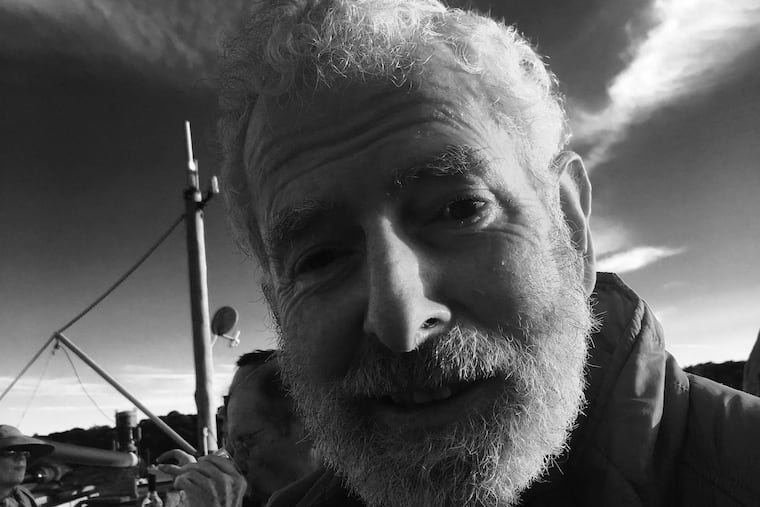Herbert W. Simons, Temple professor who encouraged dialogue and debate, has died at 86
Simons was a Temple University communication and rhetoric professor for more than a half century who championed civil rights and nurtured the careers of many colleagues.

Herbert William Simons, 86, a Temple University communication and rhetoric professor for more than a half century who championed civil rights and nurtured the careers of many colleagues, died April 17 of heart failure at Presbyterian Medical Center in Philadelphia.
Mr. Simons, who started his academic career at Temple in 1960 and essentially never left, cared deeply about engaging students and faculty in vigorous debate on the most important issues of the day, his friends and family said. He founded and for a time advised a debate and discussion group at Temple and in 1998 started an issues forum that featured debate and discussion events on issues such as the death penalty. Some of the events were broadcast on WHYY’s Radio Times.
“He was able to bring together people from opposing sides for debates that were of real interest and gathered wide audiences,” said Miles Orvell, an English professor and director of graduate studies in English at Temple.
» READ MORE: Bringing the mind back to life
Mr. Simons told the student newspaper, the Temple News, in 2002 that he started the forum to reengage the university “in discussion and exploration” and hoped it would be his legacy.
“I believe that ideas matter more than jobs do, and it is important that we teach students how to think critically about issues as well, and not just tailor their education to push them right into a specific job,” he said.
Though Mr. Simons remained at Temple until his retirement in 2008, when he received emeritus status, his work took him to many places. He taught and lectured at the University of California Santa Barbara, the University of Iowa, the East-West Center in Honolulu, Uppsala in Sweden, and Temple’s campuses abroad. He also was a Fulbright specialist at Hong Kong Baptist University. Even in retirement, in 2011, he traveled alone to Cairo to watch and assess the Tahrir Square protests.
He also went to Havana, Cuba, in 2015 to try to establish student exchange programs and attended an international meeting of information and communication researchers and scholars.
Born in the Brooklyn neighborhood of Sea Gate in 1935, Mr. Simons got his bachelor’s degree in 1956 from the University of Vermont and his doctorate in communication from Purdue University in 1960. He met his wife, Gayle Breuninger Simons, in 1967 at a party and married her Oct. 30, 1969, on mischief night, as she recalled.
Mr. Simons vigorously opposed the Vietnam War and pushed the boundaries for causes he believed in, his friends and family said.
“He did lots of things to try to make things better for people who had been treated unfairly,” said Karen Tracy, emeritus professor of communication at the University of Colorado Boulder, who dedicated her first book to Mr. Simons.
In the early 1960s, he served as an adviser at a day camp for children who lived near the Temple campus in North Philadelphia. He took the children to the apartment complex where he lived and let them swim in the pool.
“People came running, saying, ‘You can’t do that,’” his wife recalled. “‘You can’t have these kids here.’ And he said, ‘Oh yes, I can. I live here and they are coming in my pool.’”
In 1989, Mr. Simons was moved by the Tiananmen Square protests and massacre and wanted to lend support to his students here and to those in China. He had someone craft a smaller version of the Goddess of Democracy — the 33-foot-tall statue that protesters built in Beijing as a symbol of their fight for freedom — and used it at rallies at Temple’s Bell Tower, recalled Art Hochner, a retired Temple professor and union leader.
A leading scholar on social movement, persuasion, and political communication, Mr. Simons published several books and won multiple awards. He also launched conferences that drew many prominent scholars, including the late American literary theorist Kenneth Burke.
Mr. Simons was a valued mentor to many, colleagues said.
“My work definitely benefited from his generous but sometimes brutal critiques,” said Kathleen Hall Jamieson, director of the Annenberg Public Policy Center at the University of Pennsylvania.
He would turn her manuscript back to her within 48 hours, and then ask her to go for a walk in Valley Green, where he would “make one insightful point after another,” she said. “I started to bring a notepad along whenever he said, ‘Let’s go for a walk.’”
Mr. Simons challenged his students with the same vigor, unafraid to push for sometimes controversial debate, said Arthur P. Bochner, distinguished university professor emeritus at the University of South Florida, who knew Mr. Simons for nearly 60 years.
“He believed the classroom had to be safe, but it didn’t have to be comfortable, that we can learn from being uncomfortable as long as we also feel safe,” Bochner said.
Mr. Simons enjoyed spending summers at his house on Megunticook Lake in Maine and playing tennis and chess — he taught his grandchildren how to play chess, said his wife of 53 years.
He took the family sailing, which his son, Michael, remembers fondly.
“He wasn’t a great sailor, which was part of the fun,” his son said. “We had to be towed in quite a few times.”
In addition to his wife and son, Mr. Simons is survived by three grandchildren as well as nephews and nieces.
A memorial service is scheduled for Saturday, June 11, at 11:30 a.m. at the Germantown Friends Meeting House, 47 W Coulter St, Philadelphia. All are welcome.